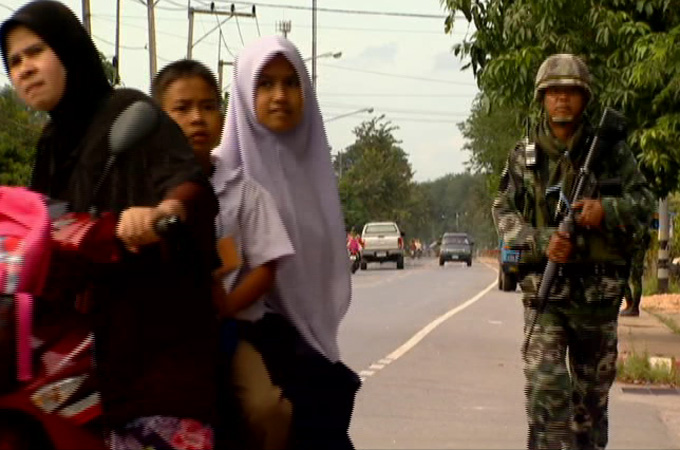
First round of talks between Thailand and separatist rebels was marred by violence killing five people [Al Jazeera]
Five people are reported killed as Thai government begins talks with separatists in neighbouring Malaysia.
Thailand and a Muslim rebel group have started peace negotiations aimed at ending nearly a decade of conflict in the country's three southern most provinces.
Thursday’s first round of talks between Thai security officials and representatives of the Barisan Revolusi Nasional rebel group in the Malaysian capital of Kuala Lumpur, however, was marred by a bomb explosion and a shooting incident that killed five people, according to Al Jazeera's Wayne Hay.
Ahmad Zamzamin, a former senior aide of Malaysian Prime Minister Najib Razak, is facilitating the talks.
Prior to talks, a roadside bomb exploded in the Chor Ai-rong district of Narathiwat province, 840 kilometres south of Bangkok, killing three soldiers who were patrolling the area, said the 4th Army Region commander, Lieutenant General Udomchai Thammasarorat.
Five other soldiers were also wounded in the ambush.
Authorities say the attack took place in a village that is home to a key leader of the Muslim separatist group taking part in talks with the Thai government.
"We suspect this was the work of local militants who want to discredit the peace talks under way in Kuala Lumpur," Udomchai said.
A separate shooting incident was also reported in Narathiwat killing two Buddhist civilians.
The husband and wife were shot in Tak Bai district, where in 2004 more than 80 Muslim men died in a confrontation with security forces.
"That kind of underscores the difficulty of these talks," Al Jazeera's Florence Looi, reporting from Kuala Lumpur, said.
More than 5,300 people have been killed in the conflict in the majority-Muslim provinces in Thailand, which are under emergency law.
Rebels have carried out shootings and bombings on monks, teachers and village officials as symbols of the majority-Buddhist state.

No comments:
Post a Comment